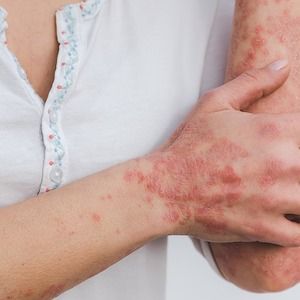Article
Positive Association Observed Between Anxiety Disorders and Psoriasis
Author(s):
This recent analysis highlighted an association between anxiety disorder and psoriasis in both children and adult patients.

A recent meta-analysis and systematic review identified an association between psoriasis and anxiety disorder/anxiety symptoms for both children and adult patients with the skin condition.
The research was led by Isabelle Jalenques from Clermont Auvergne University’s Adult Psychiatry and Medical Psychology Department at the Institut Pascal in France.
The study aimed to assess the precise magnitude of psoriasis and anxiety disorders/anxiety symptoms’ association, which the investigators stated was unknown.
“The magnitude of the association between psoriasis and depression has been evaluated, but not that between psoriasis and anxiety,” Jalenques and colleagues wrote. “The aim of this systematic review and meta-analysis was to examine the prevalence and odds of anxiety disorders and symptoms in patients with psoriasis.”
Research and Methods
The investigators used 5 medical databases (Cochrane Database, EMBASE, PubMed, PsychINFO, ScienceDirect) to identify the relevant literature for their analysis, noting a total of 101 eligible articles.The research team used the following search terms in their database searches:
- Psoriasis AND anxiety
- Generalized anxiety disorder
- Phobia
- Panic disorder or panic
- Obsessive compulsive disorder (OCD) or obsession or compulsion or OCD
The researchers excluded cohort studies and studies which dealt exclusively with patients diagnosed with psoriatic arthritis.
The studies included in the investigators’ meta-analysis also were required to be primary research, and no limits were set by the team on study size, year published, language, or age of study participants.
Study Results
The meta-analysis’ results indicated that there were different prevalence rates of anxiety for psoriasis patients depending on the anxiety disorder type.
The investigators’ analysis demonstrated a high anxiety symptom prevalence at a rate of 34% ([95% CI 32 – 37]), and case-control studies also indicated that there was a positive association between unspecified anxiety disorders and psoriasis (odds ratio 1.48 [1.18; 1.85]) and also between anxiety symptoms and psoriasis (odds ratio 2.51 [2.02; 3.12]).
The results indicated that there were rates of 15% [95% CI, 9 – 21] with social anxiety disorder, 11% [9 – 14] with generalized anxiety disorder (GAD), and 9% with [95% CI 8 – 10] unspecified anxiety disorder.
The researchers did add that there were not a sufficient number of studies exploring alternate anxiety disorders to determine the true prevalence of these conditions.
“The study evidences high prevalence rates of anxiety symptoms and some anxiety disorders in patients with psoriasis and a positive and significant association between psoriasis and anxiety symptoms and unspecified anxiety disorder,” they wrote. “In addition, it shows that the prevalence of anxiety symptoms and some anxiety disorders varies notably according to methodological factors.”
The study, “Prevalence and Odds of Anxiety Disorders and Anxiety Symptoms in Children and Adults with Psoriasis: Systematic Review and Meta-analysis,” was published online in Acta Dermato-Venereologica.





